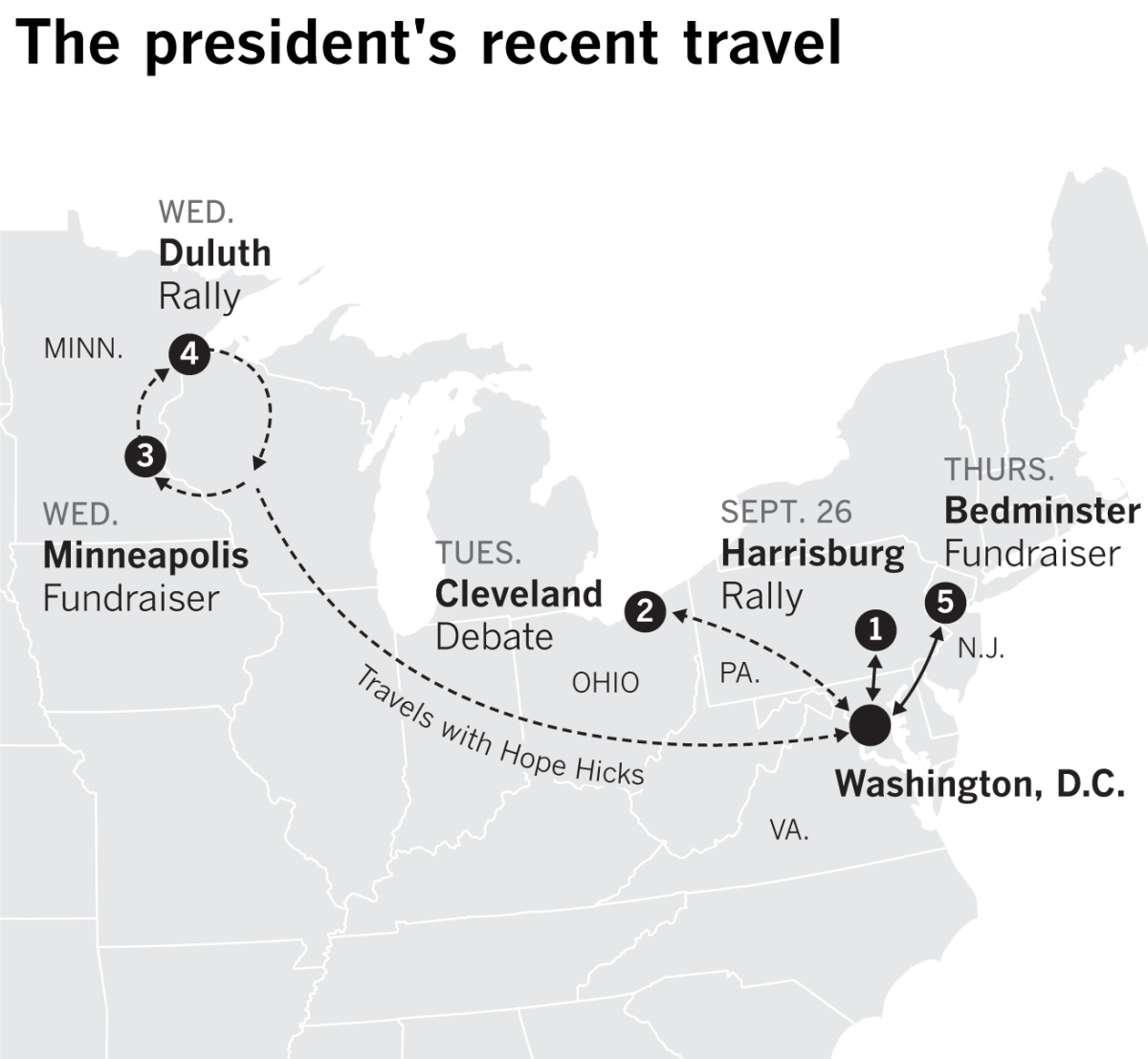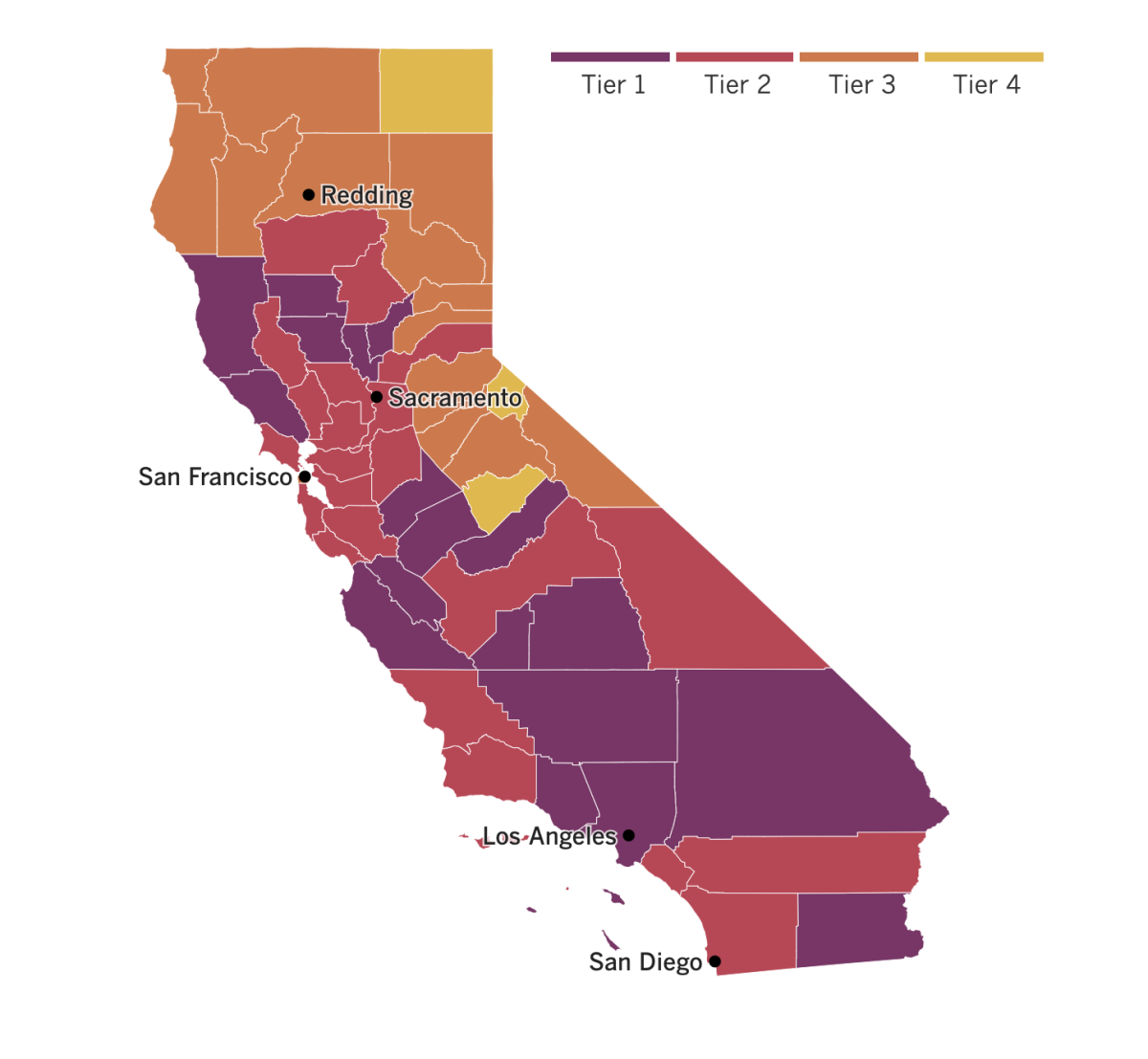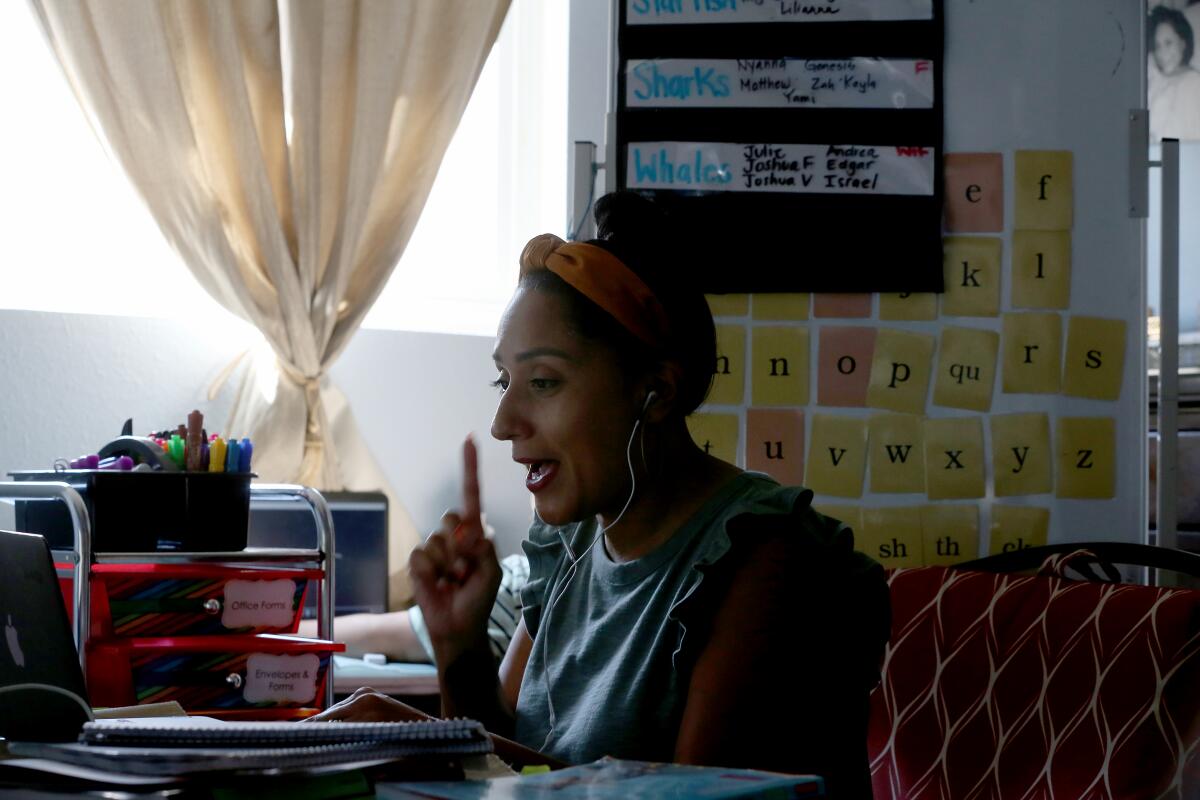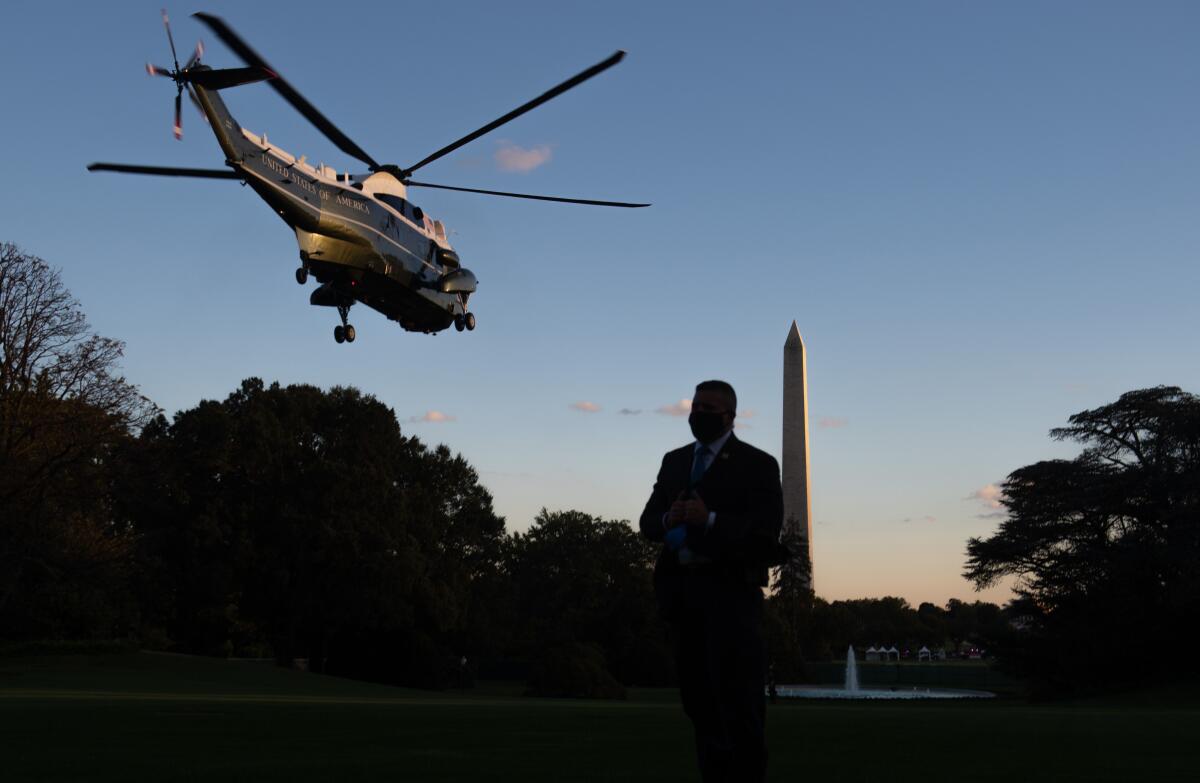Coronavirus Today: Trump has COVID-19. Now what?
Good evening. I’m Sam Schulz, The Times’ newsletter strategy editor, filling in as my colleagues report today’s extraordinary news. It’s Friday, Oct. 2, and here’s the latest on what’s happening.
In California, we’ve now surpassed 16,000 deaths related to the coronavirus. Nationwide, the economy’s recovery from its pandemic-fueled downturn is weakening as hiring slows. But the news that obliterates all that comes from Washington, where the president has COVID-19.
Less than a day after his late-night tweet that he and the first lady had tested positive for the coronavirus, President Trump was airlifted to Walter Reed Military Medical Center, where the White House expects him to remain “for the next few days.” White House officials said he had mild symptoms and was being hospitalized “out of abundance of caution.”
Meanwhile, people who had come into close contact with him recently — and there are a lot — have scrambled to get tested or share results. In California’s more conservative corners, his supporters have struggled to process the news. In Los Angeles, people have reacted with a mix of unsurprise, skepticism and anger that the president hadn’t taken seriously a disease that had ravaged their communities. Online, conspiracy theories and misinformation have spread.
And plenty of questions have arisen — about the president’s health, his prognosis and what happens now.

Trump has not transferred his authority to Vice President Mike Pence, and Pence has tested negative for the coronavirus, his office says, allaying immediate concerns about the presidential line of succession should Trump become incapacitated.
Given the president’s age, sex and obesity, there is cause for concern. Those three attributes put him at increased risk of developing a severe case of COVID-19.
Those odds rise steadily with age, according to the Centers for Disease Control and Prevention. Since the early days of the pandemic, researchers have observed that COVID-19 patients who are obese fare worse than those who are not. (Trump is considered just above the threshold for obesity based on a report in June from his doctor.) And although men and women are about equally likely to be infected with the coronavirus, researchers have observed a consistent gender gap among seriously ill COVID-19 patients.
After seven months of scrambling, physicians have improvised, revised and refined treatments for COVID-19 in its many and varied forms. But most of their patients have had advanced COVID-19, and the president’s doctors are keen to prevent his progression to that status. The treatment of the disease in its early stages is a newer and subtler challenge.
In a letter, Trump’s doctor said the president was taking a single dose of an experimental antibody cocktail. Its maker, Regeneron, which is still conducting clinical trials, strikingly described the cocktail this week as a “substitute for the naturally occurring immune response” in patients who were “less likely to clear the virus on their own, and were at greater risk for prolonged symptoms.”
Medical experts were alarmed that the president was taking a drug that was still in a testing phase, suggesting his condition might be more serious than disclosed. “You wouldn’t do that with somebody who is just having an uncomplicated case,” said Dr. Amesh Adalja, a senior scholar at the Johns Hopkins University Center for Health Security. Adalja also said it wasn’t surprising that Trump was being hospitalized given his age and weight and reports of a possible fever.
Doctors have also administered the anti-viral medication remdesivir, a treatment for early COVID-19, and they may also be readying him for another, convalescent plasma therapy. But at this point, we just don’t know.
Like we said, plenty of questions. Here are more, and what we know so far.
— Where did Trump catch the virus? And whom might he have infected? Dozens of high-ranking people who had recently met with him at fundraisers, news conferences, on the debate stage and even on Air Force One are either getting tested for the virus or releasing the results of tests they’d already taken. From his Supreme Court nomination ceremony last weekend to campaign rallies, here is a look at key events where he could have caught the virus — or spread it to others.

— What about Joe Biden? After he and his wife tested negative, he’s still campaigning — but some experts say it could be days before they can be assured he’s not infected. “Biden is not out of the woods yet,” said Dr. John Swartzberg of UC Berkeley. He said Trump probably was already infected by Tuesday, despite his negative test result before the debate; he may not have had enough of the virus to show up on the test. Getting tested too early after exposure can yield a negative test result even if a person is infected, and it can take time for COVID-19 symptoms to develop.
— Who else could be infected? Former Trump advisor Kellyanne Conway is. Sens. Thom Tillis and Mike Lee are. So are Republican National Committee chair Ronna McDaniel, three journalists who work at the White House and the president of the University of Notre Dame, who attended the ceremony where Trump nominated Judge Amy Coney Barrett to a seat on the Supreme Court. More than a dozen Senate Republicans attended, and like most of the crowd, many did not wear masks. We’re following the latest on our live blog.
— What now for the presidential campaign? With a month left, it’s unclear how it will proceed. Among the uncertainties: the fate of the next two presidential debates, which could give Trump a do-over after Tuesday. Next week’s vice presidential debate is expected to go on as planned. But the Trump campaign moved to postpone or turn virtual all its planned events involving him and his family — including fundraisers in Orange County and Beverly Hills. The Biden camp pulled its negative ads. But in many ways the race is unchanged, which could spell trouble for Trump. In Iowa, he’s already running out of time.
Have more questions? We answer many of them here. And as always, write to us at coronavirus@latimes.com with others.
By the numbers
California cases and deaths as of 4:36 p.m. PDT Friday:

Track the latest numbers and how they break down in California with our graphics.
See the current status of California’s reopening, county by county, with our tracker.


What else to read this weekend
COVID-19 brought theater to a stop, but it also started something. The shutdown seemed staggering at first. But then the leaders of Los Angeles’ small theater companies commiserated, argued, laughed, dug for answers and brainstormed. One result? A free online festival of 10-minute plays that continues through Oct. 17. Called Together L.A., the event sends the message that theater is not only still being made, it’s also innovating. Watch the plays here.
What does it take to be named “teacher of the year” during a pandemic? Every Monday, Ericca Dent asks her second-graders how they’re feeling — thumbs up, or thumbs down? Hazel Kight Witham is leading a weeks-long “happiness challenge,” asking her high-school students to exercise, meditate, journal and list what they’re grateful for. Rhiannon Chavez has poured her energy into making her enthusiasm span the digital divide and keep her fourth-graders engaged. And all their experiences show how mightily even L.A. County’s best teachers are challenged during this crisis.

The pandemic has upended how South Koreans are honoring the dead on their Chuseok holiday, trading graveside rites for Zoom respects. Normally, families would visit graves and bow at altars lined with the season’s harvest on which the ancestors’ spirits are said to feast. But out of concern that Chuseok could lead to a surge in infections, authorities are encouraging people to hold traditional ceremonies over Zoom, to visit gravesites virtually through new online portals and to check in on their ancestors’ resting places through drone footage posted on YouTube.
Your support helps us deliver the news that matters most.
What to do this weekend
Soak up some arts and culture. If you’re desperate to do so in person, here are six safe shows in Southern California, from site-specific dance to classical guitar to drive-in jazz. If you’d rather stay home, the 16 picks on our weekend culture watch list include a Latino Heritage Month mural exhibition and a Black Lives Matter co-founder’s latest video art. And in his Indie Focus newsletter, Mark Olsen recommends some new movies.
Eat, and maybe make, some kimchi. Fall is the perfect time to make kimchi with a pro, eat the many varieties of L.A.’s best kimchi and learn more about the shops that make it — or just learn about its profound comforts. Try our recipes for this traditional kimchi with cut napa cabbage, this crunchy one that swaps in chayote for daikon radish or this refreshing kimchi that’s lighter on the hot pepper.
Get gardening. In Southern California, fall is actually an ideal, and easier, time to get started growing food. Here are 12 fruits and vegetables you should plant right now. And here are five fall plant sales you shouldn’t miss.
Go online. Here’s The Times’ guide to the internet for when you’re looking for information on self-care, feel like learning something new or interesting, or want to expand your entertainment horizons.
Resources
— For general safety, wash your hands for at least 20 seconds (here’s a super-fun how-to video). Stop touching your face, and keep your phone clean. Practice social distancing, maintaining a six-foot radius of personal space in public. And wear a mask if you leave home. Here’s how to do it right.
— Watch for symptoms including fever, cough, shortness of breath, chills, repeated shaking with chills, muscle pain, headache, sore throat and loss of taste or smell. If you’re worried you might be infected, call your doctor or urgent care clinic before going there.
— Need a COVID-19 test? Here’s how to receive a free test if you’re in L.A. County. And here’s a map of testing sites across California.
— Here’s how to care for someone with COVID-19, from monitoring their symptoms to preventing the virus’ spread.
— If your job has been affected by the pandemic, here’s how to file for unemployment.
— Here are some free resources for restaurant workers and entertainment industry professionals having trouble making ends meet.
— Advice for helping kids navigate pandemic life includes being honest about uncertainties, acknowledging their feelings and sticking to a routine. Here’s guidance from the CDC.
— In need of mental health services? Here are resources for coping during the crisis from the CDC and the L.A. County Department of Mental Health. L.A. County residents can also call (800) 854-7771 or text “LA” to 741741.
— For domestic violence victims, the pandemic can pose a “worst-case scenario,” advocates say. If you or someone you know is experiencing such abuse, call the National Domestic Violence Hotline at 1-800-799-SAFE (7233) or L.A. County’s hotline at 1-800-978-3600. Here are more ways to get help.
The pandemic in pictures

Our reporters covering the coronavirus outbreak want to hear from you. Email us your questions, and we’ll do our best to answer them. You can find more answers in our Frequently Asked Questions roundup and in our reopening tracker.
For the most up-to-date coronavirus coverage from The Times over the weekend, visit our homepage and our Health section, sign up for our breaking news alerts, and follow us on Twitter and on Instagram.




